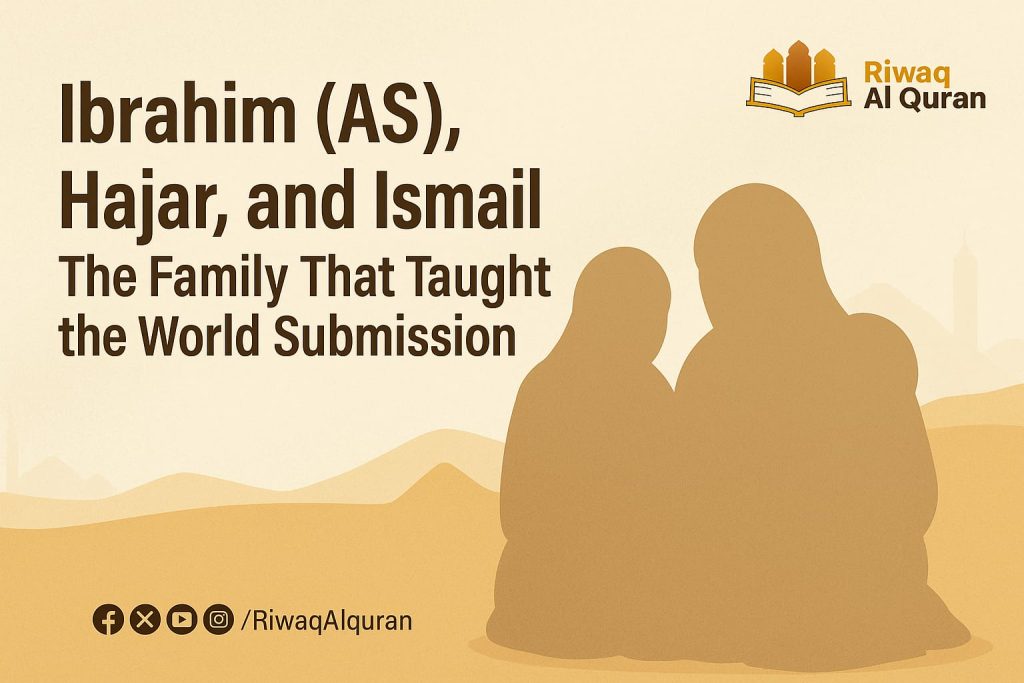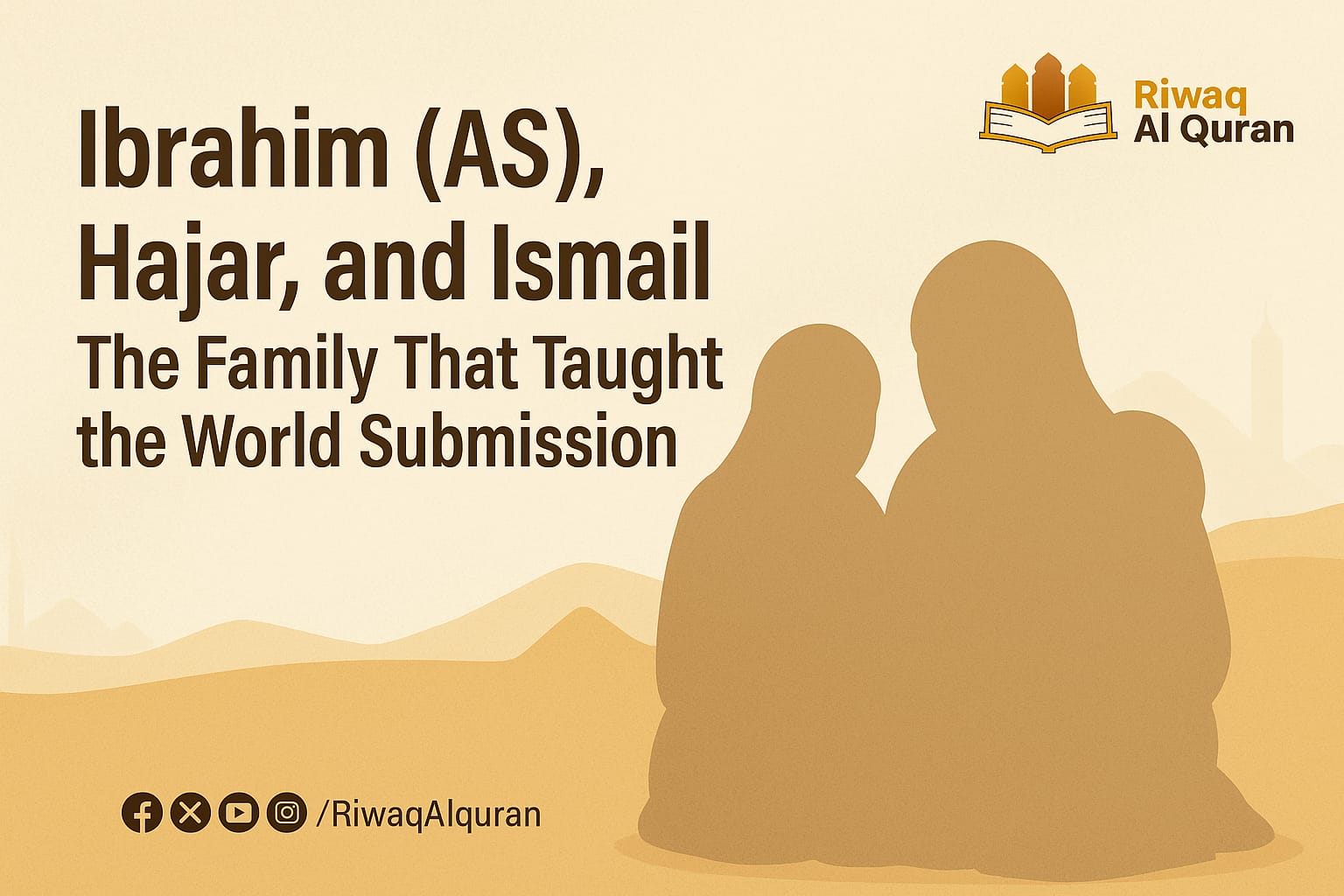In a world that glorifies self-reliance and instant gratification, the story of Prophet Ibrahim (peace be upon him), his wife Hajar, and their son Ismail stands as a timeless testament to ultimate submission to Allah’s will. This family’s unwavering faith through unimaginable trials redefines what it means to surrender to the Creator.
In this article, we will explore in detail how Ibrahim’s family redefined submission to Allah through their trials and the lessons derived from their tests. We will then examine key lessons for modern families navigating today’s fast-paced world. Finally, we will highlight how Allah honored this noble family in the Quran.
Table of Contents
Ibrahim’s Family Redefinition Of Submission To The Creator
From Ibrahim’s willingness to leave his beloved wife and infant in a lifeless valley to Hajar’s desperate run between Safa and Marwa mountains for water, and Ismail’s calm acceptance of being sacrificed, latter on, by his own father, here is how each member of this family became a universal teacher of submission. These are only examples of the sacrifices of this noble family. Let’s start.

All three members of this noble family faced two severe tests and passed with perfect submission, earning Allah’s praise. Let’s explore those tests:
First: The test of Leaving Family in the Desert:
Allah commanded Prophet Ibrahim (peace be upon him) to abandon his beloved wife Hajar and son Ismail in the barren valley of Mecca. Despite the emotional agony, Ibrahim obeyed, saying only:
“Our Lord! I have settled some of my offspring in a barren valley, near Your Sacred House…” (the Quran, 14:37).
Lesson:
Submission means trusting Allah’s plan, even when it defies human logic.
Second: The Test Of Sacrifice:
Allah ordered Ibrahim (peace be upon him) in a dream to sacrifice his son. Both Ibrahim and Ismail (peace be upon them) submitted. At the last moment, Allah replaced Ismail with a ram, sparing his life. Their submission was honored, and the act became a cornerstone of Islamic faith.
Lesson: True faith requires sacrificing what we love most for Allah’s sake.
Third: From Distress to Miracles:
When Ibrahim (peace be upon him) was about to leave his wife and baby in the uninhabited desert of Mecca, Hajar asked him:
“O Abraham! Where are you going, leaving us in this valley where there is no person whose company we may enjoy, nor is there anything (to enjoy)?” She repeated that to him many times, but he did not look back at her. Then, she asked him: “Has Allah ordered you to do so?” He said, “Yes.” She said: “Then He will not neglect us.”
Lesson: Complete trust in Allah is the key. If Allah commands you to do something, you MUST obey regardless of how illogical it may seem.
Fourth: The Legacy of Sa’i (السعي):
Left alone in the barren desert with her baby and with only some dates and water, Hajar ran between Safa and Marwa hills seven times, pleading for help and searching for water. Her trust in Allah was rewarded with the miracle of Zamzam, a spring that still flows today.
She initiated the ritual of Sa’i (the ritual of walking back and forth seven times between the two small hills of Safa and Marwah in Mecca, during Hajj). The literal meaning of the word is to strive and be positive. Muslims reenact her run during Hajj, teaching that persistence in hardship is honored, and trust in Allah is rewarded—even if results aren’t immediate.
Lesson: Submission is not passive—it is striving while relying on Allah.
Fifth: Ismail as The Model Of Obedience
When Ibrahim was ordered to slaughter his son, Ismail showed such great self-denial and surrender to Allah’s will that he never questioned why. He just obeyed, saying: “O my dear father! Do as you are commanded. Allah willing, you will find me steadfast.”
That’s why Allah blessed him, made him a prophet like his father, and made his offspring a great nation [the Muslim Ummah].
Lesson: Obedience to Allah must come before personal desires.
Lessons For Modern Families In A Fast-Paced World
In an era of instant gratification, the stories of Prophet Ibrahim, Hajar, and Ismail teach humanity several great lessons. To name but a few:
1- Submission Is Not Weakness.
To submit to Allah’s commands is the highest strength. By comparison, rebellion against Allah’s will is weakness, as it simply shows that a person is so much attached to their worldly desires that they cannot sacrifice anything for Allah.
Ibrahim’s (AS) test was not merely about sacrificing a child—it was about sacrificing what he loved most. The real question you should ask yourself, here, is: Am I ready to do the same for Allah? Ibrahim was.
2- Submission Does Not Mean Passiveness.
Though Hajar trusted that Allah would save her baby and herself, she did not wait passively beside her crying, thirsty, and hungry baby. Rather, she kept running from one hill to another, seven times, striving until the miracle of Zamzam emerged. It is a lesson for all mankind to strive until the last breath.
3- The Answer Can Come From The Most Unexpected Place.
Although Hajar searched for water everywhere in the valley, the water came just from underneath the baby’s feet. The message is that the solution can be very near and can come from the most unexpected place. However, a Muslim must strive with full trust in Allah and relentless effort, leaving no path untried until the mission is accomplished.
4- Trials Are Blessings.
When life is smooth, it is easy to rely on our own understanding. But trials force us to surrender control, seek higher wisdom, and trust in a greater plan. Many people find their deepest spiritual growth during their hardest times. That’s why Hajar’s struggle became a perpetual well of mercy for mankind.
5- Resisting The Devil Is The Key.
Test times are the golden times for the devil’s whisper and interference. His ultimate goal is to lead mankind to disobey their Creator. During hardships, he intensifies his whispers, urging people to rebel against Allah’s commands and follow their desires. This is what he attempted with Ibrahim, Hajar, and Ismail. They all stoned him and followed Allah’s command.
How Did Allah Honor This Noble Family?
Allah praised Prophet Ibrahim (peace be upon him) and his family in the Quran for their unwavering faith, devotion, and submission to His will. Allah immortalized their submission in the Quran:
“وَمَنْ أَحْسَنُ دِينًۭا مِّمَّنْ أَسْلَمَ وَجْهَهُۥ لِلَّهِ وَهُوَ مُحْسِنٌۭ وَٱتَّبَعَ مِلَّةَ إِبْرَٰهِيمَ حَنِيفًۭا ۗ وَٱتَّخَذَ ٱللَّهُ إِبْرَٰهِيمَ خَلِيلًۭا”
[And who is better in faith than those who ˹fully˺ submit themselves to Allah, do good, and follow the Way of Abraham, the upright? Allah chose Abraham as a close friend.]
Also, Allah blessed Ibrahim’s sons, Ismail and Ishaq, and their descendants with prophethood, making his family a lineage of chosen messengers.
Allah says in the Quran:
“…وَجَعَلْنَا فِى ذُرِّيَّتِهِ ٱلنُّبُوَّةَ وَٱلْكِتَـٰبَ…”
[…and reserved prophethood and revelation for his descendants…]


Learn Quran, Arabic And Islamic Studies Online With The Best Native Tutors
Riwaq Al Quran is a comprehensive online platform that offers personalized Quran, Arabic and Islamic Studies Online classes for individuals of all ages and backgrounds.
Their experienced instructors use a structured curriculum to cover Tajweed, Tafsir, and Memorization, providing easy and effective access to learning the Quran.
The advanced online classes allow for seamless communication and interaction between students and teachers. Join Riwaq Al Quran for a deeper connection with the Quran.
We offer several courses such as:
- Online courses for kids.
- Online Quran classes for kids and adults.
- Online Arabic courses
- Online Ijazah courses
- Online Islamic Studies courses.
Conclusion
Each moment in the journey of Prophet Ibrahim’s family is a masterclass in submission and trust in Allah. They didn’t just submit—they transformed submission into a timeless act of love for Allah. Their story invites us to ask: What is my desert? What am I willing to sacrifice? What is my “Ismail”? These questions must be answered by every Muslim who is keen to embody Islam’s true meaning: total submission to Allah.


































